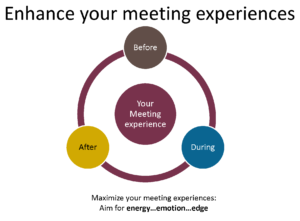 Do your meetings have the energy, emotion and edge needed to keep you and others engaged, performing at your peak, and achieving the results you want?
Do your meetings have the energy, emotion and edge needed to keep you and others engaged, performing at your peak, and achieving the results you want?
If not, how would you describe your meeting experiences?
You probably will refuse, but I hope you will take a moment to answer a few questions about your meetings. The direct link is: https://www.surveymonkey.com/r/meetingsexp.
Your responses will help my colleague Scott Wigley and me as we work to help you improve your meetings as well as our own. Our goal is to share any survey results and observations with you before the end of November, which coincides with end of the Atlantic hurricane season.
You see, meetings are similar to the weather – something we all experience, complain about when they’re not to our liking, and often consider ourselves victims because we believe we can’t control the situation.
Yet, we can influence meetings regardless of our role.
Whether we’re a participant or a leader, if we take a broader perspective of meetings, we can make them feel less of an ordeal and more of a welcome experience.
In fact, “experience” is the operative word. Considering the percentage of our life that we spend in meetings, we deserve to feel like we’re taking part in meaningful events rather than going through the motions and marking time.
How do you change your perspective to first view meetings as more than a work obligation and then to create a meaningful meeting experience?
You need to take these steps, based on the brain science and our years of designing, facilitating, and sitting in meetings:
- Plan the pre-meeting and post-meeting steps just as carefully as you do the meeting itself. (And if you don’t do much meeting preparation, start.)
- Adopt brain-friendly principles to follow throughout your planning and the steps. These include:
- Being open and positive. Depending on your meeting role, think of yourself either as a gracious host or genial guest who will do your best to welcome others and work to bring out the best in them. (See Let’s have a party for more about this.)
- Chunk the content. Keep meetings as short as possible, preferably no longer than 90 minutes at a one time. And for any meetings longer than 15 minutes, mix things up to help people pay attention and focus. (For more on this, check out To improve recall, use social learning.)
- Engage participants. To keep people interested in the meeting content and each other, encourage participants to interact with one another, ask questions, take turns talking, co-create together, and celebrate wins of all sizes and milestones. (For more, read 3 ways to increase your team’s smarts.)
- For each of the three steps (before, during, and after), take actions that will make it easier for participants to follow along and benefit from the experience, as well as enjoy it. To avoid overtaxing your brain now, we’ll share details about these actions in future blog posts.
Meanwhile, even though you will probably refuse, I hope you will answer these quick questions about your meeting experiences. The direct link to the brief assessment is: https://www.surveymonkey.com/r/meetingsexp.
(And if you’re wondering why I’m asking you even though you probably will refuse, it’s because it’s a persuasion technique that works well. That’s because you are free to choose whether to take action or not. For more about this, read You Will Probably Refuse, But I Wonder If You Would Read This Post in the Science of Us.)
As for your meetings, life is too short to suffer through bad meetings. You deserve meetings that energize you, help you make emotional connections with others, and sharpen your edge to advance your work.
If most of your meetings range from “bad” to “meh,” it’s time to enhance your meeting experiences. Or not. It’s your choice. However, you can start by taking this assessment: https://www.surveymonkey.com/r/meetingsexp.

0 Comments